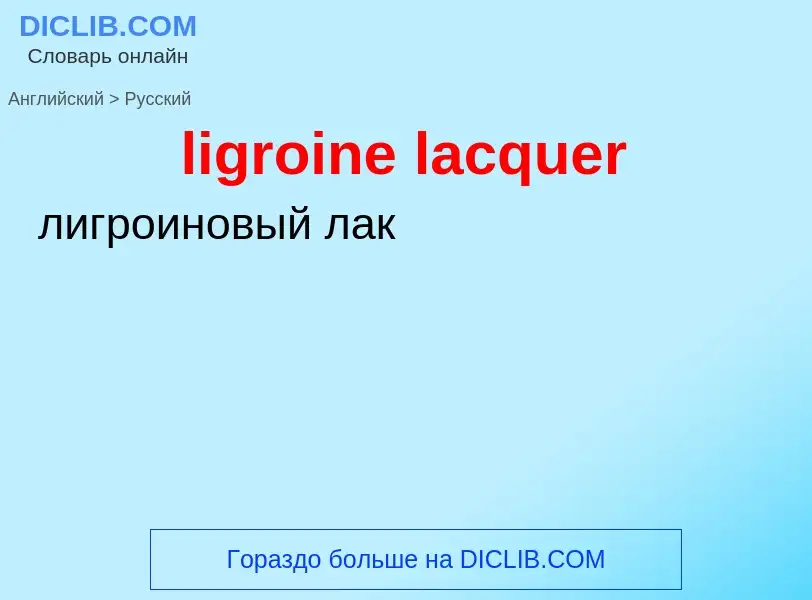Перевод и анализ слов искусственным интеллектом ChatGPT
На этой странице Вы можете получить подробный анализ слова или словосочетания, произведенный с помощью лучшей на сегодняшний день технологии искусственного интеллекта:
- как употребляется слово
- частота употребления
- используется оно чаще в устной или письменной речи
- варианты перевода слова
- примеры употребления (несколько фраз с переводом)
- этимология
ligroine lacquer - перевод на русский
['lækə]
общая лексика
залакировать
залакировывать
лак
лакообразование
нагарообразование
существительное
['lækə]
общая лексика
лак
политура
глазурь
собирательное выражение
лакированные изделия
лак, лакированные изделия
глагол
общая лексика
покрывать лаком
политурой или глазурью
лакировать
покрывать лаком, лакировать
покрывать глазурью
общая лексика
цапоновый лак
общая лексика
лакирование
лакировка
лакировочный
[tʃaini:z'lækə]
общая лексика
китайский лак
лак из камеди
сумаха
общая лексика
лаковое дерево
сумах лаконосный (Rhus verniciflua)
Определение
Википедия
 MET DP704215.jpg?width=120)
Lacquer is a type of hard and usually shiny coating or finish applied to materials such as wood or metal. It is most often made from resin extracted from trees and waxes and has been in use since antiquity.
Asian lacquerware, which may be called "true lacquer", are objects coated with the treated, dyed and dried sap of Toxicodendron vernicifluum or related trees, applied in several coats to a base that is usually wood. This dries to a very hard and smooth surface layer which is durable, waterproof, and attractive in feel and look. Asian lacquer is sometimes painted with pictures, inlaid with shell and other materials, or carved, as well as dusted with gold and given other further decorative treatments.
In modern techniques, lacquer means a range of clear or pigmented coatings that dry by solvent evaporation to produce a hard, durable finish. The finish can be of any sheen level from ultra matte to high gloss, and it can be further polished as required. Lacquer finishes are usually harder and more brittle than oil-based or latex paints, and are typically used on hard and smooth surfaces.
In terms of modern finishing products, finishes based on shellac dissolved in alcohol are often called shellac or lac to distinguish them from synthetic lacquer, often called simply lacquer, which consists of synthetic polymers (such as nitrocellulose, cellulose acetate butyrate ("CAB"), or acrylic resin) dissolved in lacquer thinner, a mixture of various organic solvents. Although synthetic lacquer is more durable than shellac, traditional shellac finishes are nevertheless often preferred for their aesthetic characteristics, as with French polish, as well as their "all-natural" and generally food-safe ingredients.

 MET DP704215.jpg?width=200)
![''mon'' (emblem)]], Japan, [[Edo period]] ''mon'' (emblem)]], Japan, [[Edo period]]](https://commons.wikimedia.org/wiki/Special:FilePath/Gourd-Shaped Sake Bottle with Aoi Crests.jpg?width=200)
![Lacquer mixed with water and [[turpentine]], ready for applying to surface. Lacquer mixed with water and [[turpentine]], ready for applying to surface.](https://commons.wikimedia.org/wiki/Special:FilePath/Lacquer in liquid form, mixed with water and turpentine.jpg?width=200)
![''Laksha'' is a traditional form of lacquerware from Sri Lanka which is made from [[shellac]] derived from [[Lac]]. ''Laksha'' is a traditional form of lacquerware from Sri Lanka which is made from [[shellac]] derived from [[Lac]].](https://commons.wikimedia.org/wiki/Special:FilePath/Laksha - ලාක්ෂා - Lacquerware.jpg?width=200)


![A [[maki-e]] and mother-of-pearl inlay cabinet that was exported from Japan to Europe in the 16th century. A [[maki-e]] and mother-of-pearl inlay cabinet that was exported from Japan to Europe in the 16th century.](https://commons.wikimedia.org/wiki/Special:FilePath/花鳥蒔絵螺鈿書箪笥-Cabinet of Drawers with Birds and Flowers MET DT6048.jpg?width=200)

 with Pavilion on a Garden Terrace LACMA M.81.125.1.jpg?width=200)
![[[Ming Dynasty]] Chinese [[lacquerware]] container, dated 16th century. [[Ming Dynasty]] Chinese [[lacquerware]] container, dated 16th century.](https://commons.wikimedia.org/wiki/Special:FilePath/Freer 002.jpg?width=200)
![Clothing box decorated with peony scrolls, [[Joseon Dynasty]] Korea, 17th century. Clothing box decorated with peony scrolls, [[Joseon Dynasty]] Korea, 17th century.](https://commons.wikimedia.org/wiki/Special:FilePath/나전 칠 모란 넝쿨 무늬 옷상자-조선-螺鈿漆牡丹唐草文衣箱子 朝鮮-Clothing box decorated with peony scrolls MET DP704158.jpg?width=200)
![[[Inro]]}} in [[maki-e]] Lacquer, [[Edo period]] Japan, 18th century [[Inro]]}} in [[maki-e]] Lacquer, [[Edo period]] Japan, 18th century](https://commons.wikimedia.org/wiki/Special:FilePath/壽字吉祥文蒔絵印籠 - Inrō with the Characters for Longevity and Good Fortune and the “Seven Lucky Treasures” on Checkerboard Ground.jpg?width=200)
![Picnic Box with Design of the Scene from ''[[The Tale of Genji]]'' in Maki-e Lacquer, Edo or [[Meiji period]] Japan, 19th century Picnic Box with Design of the Scene from ''[[The Tale of Genji]]'' in Maki-e Lacquer, Edo or [[Meiji period]] Japan, 19th century](https://commons.wikimedia.org/wiki/Special:FilePath/竹貼源氏蒔絵提重-Picnic Box with Design of the Scene from the Tale of Genji in Maki-e Lacquer.jpg?width=200)
![B.Thulhaadhoo]], [[Maldives]]. B.Thulhaadhoo]], [[Maldives]].](https://commons.wikimedia.org/wiki/Special:FilePath/Laquer-finished.jpg?width=200)


